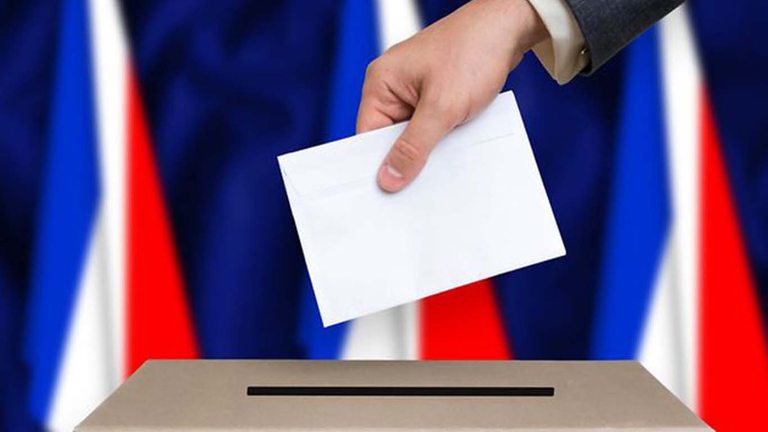
On Sunday, June the 12th, the French people will go to the polls to vote in the first round of the French legislative elections. Each of the 577 constituencies in France elects their local member of parliament to represent them in the assembly national. These elections are not to be confused with the presidential election that happened in April, when incumbent Emanuel Macron was re-elected for a second term. These legislative elections instead decide the composition of the French legislature and, therefore, who has the legislative power in parliament. This time around, it looks very possible that Macron and his party in March might be able to get a parliamentary plurality, leading to a political situation known in France as cohabitation. So in this article we're going to do a quick primer on the upcoming election.
So, first things first, how did the elections work? French legislative elections operate in two rounds. In the first round, candidates from each party can win their constituency if they win more than 50% of all votes. In the 2017 legislative elections, only four seats were won this way. If no candidate reaches the 50% mark, all candidates with 12.5 percent or more of all votes reach the second round, where there is a simple first-past-the-post system to elect the constituency's representative. This means that unlike in presidential elections where only two candidates can reach the second round runoff election, three candidates can reach the second round in what is known as a triangular or even four in what's known as a quadrangular.

In theory, as many as eight candidates could get through to the second round, but it's rare that more than three ever get through. In fact, it's rather odd that even two get through. At the end, whichever party wins the most constituencies achieves a parliamentary plurality, and the president must choose a prime minister of that political party even if it doesn't align with their own. So what are the main political parties that the French will choose between? Since Macron's original election in 2017, France's political landscape has been completely redrawn. There are now three major political blocs in France: the left, led by Jean-Luc Mélanchon, former leader of the La France Assamese; the center-right, led by Emmanuel Macron and the Lay Republic on Marsh; and the far right, led by Marine Le Pen. The biggest news election-wise is the new long-awaited coalition party, noops, or the new popular ecological and social union between the four main left-wing parties. The explicit goal of the union is to prevent the left-wing vote from being split, as happened back in 2017, and to beat Macron's lrem in the upcoming legislative elections.
In what Melenchon has repeatedly described as a third round of the presidential election, the right, on the other hand, is pretty much as split as it could be. Right-of-center voters must choose between Macron's brand of center-right politics and the far right, which is led by Marine Le Pen and a new, even more extreme candidate named Eric Zamore. For the traditional right-wing party le republica, their candidate Valerie Perchess didn't even get her deposit back, scoring less than the needed five percent in the presidential elections. Even though they did perform surprisingly well at the regional elections last year, either way, she's just yet another name added to the right list of candidates, further dividing voting options. This means that although the rights may in fact end up with more combined votes than noops noops, they could still end up winning due to the spoiler effect, which refers to the division of votes within the same political side. So what happens if Mac's party doesn't win a parliamentary plurality?

Well, there have only been three cohabitations in France's political history: twice under Francois Mitterrand from 1986 to 1988 and from 1993 to 1995; and once under Jacques Chirac from 1997 to 2002. If von Marsh ends up losing a parliamentary plurality, it would mean that Macron could have a very tough time trying to pass new policies in parliament and it could even damage France's relationship with the European Union. Le Pen, for instance, has always been a vocal critic of the EU, at one point even supporting the so-called frexit, although we should say that she now instead favors reforming the EU from within. She also champions her program of brethren's nationality, which essentially gives French citizens priority over foreigners, including Europeans, for housing and jobs. This would be a violation of the French constitution as well as European law, which both ensure equality under the law of all citizens without distinction of origin, race, or religion. But as prime minister, she could technically pass such a program if she could wrangle a plurality in parliament.
Melanchol also has qualms with the European Union, and the EU would certainly struggle with him. Generally, in times of cohabitation, the president is left to deal with foreign policy as he pleases, but domestic policies are handled by the government. This means that if Macron doesn't win, matters such as education, health, the economy, culture, labor, and justice would be decided by whoever has a plurality in parliament. Meaning that Le pen's preferred national program could still pass, even with Macron as president. Macon could choose to dissolve the Assan Blade National, but there's obviously no guarantee that the following general election will be any better for him. So who's going to win? At the time of writing. All overseas territories, including the UK, have already voted and the polls so far give Noops a slim plurality, 31 percent to Marsh's 27 percent. But Macron is still projected to win a parliamentary plurality via victories in the second round. According to Politico's poll of polls, LREM is on track to win somewhere between 275 and 318 seats. While noops are looking at between 158 and 196 seats, with the remaining seats divided among the various right-wing parties.

Interestingly, despite a poor showing in the presidential election, polling suggests lay republicans are on track to do better than Le Pen's national rally. That being said, anything could still happen with the vote six days from now in April. Right after the election, Macron might have thought himself invincible with a plurality representing a worst-case scenario for him, but his poll lead has been narrowing since then and the consolidation of the left-wing parties represents a major challenge. Melonsho has also claimed that Macron is terrified of losing the parliamentary plurality and has no idea what to do to preserve his current 266-seat plurality. In the end, only time will tell.